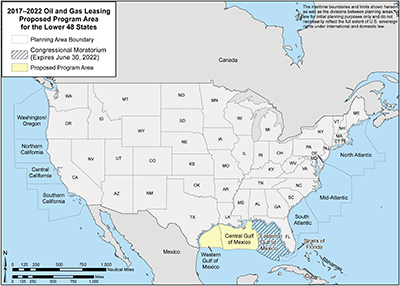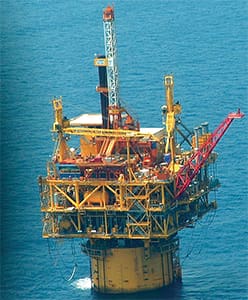After a long and contentious debate that pitted boaters, coastal communities and the fishing industry against Big Oil, the Obama administration has reversed its original stance and directed the Interior Department to remove 104 million acres of the mid- and southeast Atlantic areas of the U.S. outer continental shelf from its 2017 oil and gas leasing program.
In the Bureau of Ocean Energy Management’s Oil & Gas Leasing Proposed Program it was noted that there was “concern regarding competing uses of the (Atlantic) Program Area and the potential harm that oil and gas development could pose to those existing uses.” Interior Secretary Sally Jewell added, “We heard from many corners that now is not the time to offer oil and gas leasing off the Atlantic coast.”
From its introduction in 2015, the Interior Department’s attempts to sell exploration and drilling in the Atlantic as a way to gain economic benefits and secure America’s energy independence did not appeal to the many who live along the East Coast. The proposed drilling zone stretched from Virginia to Georgia, where millions of existing jobs depend on a healthy ocean for tourism, boating, and both recreational and commercial fishing — all of which would suffer in the event of a spill similar to the 2010 Deepwater Horizon disaster.
 |
|
A map showing oil and gas leasing program areas for the lower 48 states. |
|
Bureau of Ocean Energy Management |
To date, 112 coastal towns have passed resolutions opposing drilling for oil in the Atlantic, and 100 members of Congress and 700 state and local elected officials publicly oppose it. “This is a victory for people over politics, and shows the importance of old-fashioned grassroots organizing,” said Jacqueline Savitz of Oceana, a nonprofit organization focused on ocean advocacy and conservation. “It will prevent oil spills and coastal industrialization; it makes seismic testing unnecessary and it will help promote the clean energy solutions that we so desperately need.” Additionally, the Department of Defense opposed the drilling, stating that it could disrupt missile tests and interfere with military operations.
Opponents of the oil and gas drilling program had argued that the Atlantic Coast was the last undrilled ocean surrounding the U.S., that a spill could have potentially devastating effects on beaches from Maine to Florida, and that seismic cannons used to explore for oil would deafen and disorient mammals, fish and sea turtles. Proponents countered with pledges of jobs and new tax revenues.
The program, however, still includes plans for drilling in the Gulf of Mexico and Arctic, and does not preclude acoustic seismic testing in the Atlantic.

